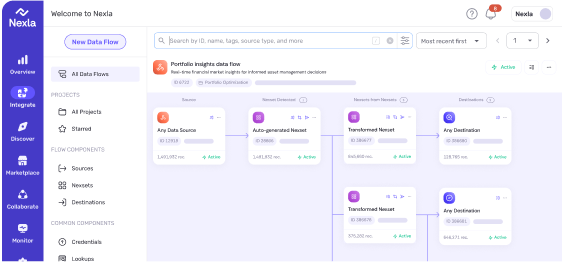
Nexla and Vespa.ai Partner to Simplify Real-Time AI Search Across Hundreds of Enterprise Data Sources
Nexla and Vespa.ai partner to simplify real-time enterprise AI search, connecting 500+ data sources to power RAG, vector retrieval, and AI apps.

Nexla and Vespa.ai partner to simplify real-time enterprise AI search, connecting 500+ data sources to power RAG, vector retrieval, and AI apps.

Nexla and Vespa.ai partnership eliminates data integration complexity for AI search and RAG applications. The Vespa connector delivers zero-code pipelines from 500+ sources to production-grade vector search infrastructure.

Reusable data products unify databases, PDFs, and logs with metadata, validation, and lineage to enable join-aware RAG retrieval for reliable GenAI applications.

In episode six of DatAInnovators & Builders Podcast, Fred Gertz explains how swarm intelligence solves NP-hard routing and scheduling problems in seconds—without training data or LLMs.

Agentic RAG systems fail when data is fragmented, stale, or inconsistent. Learn how AI-ready data products with standardized schemas, governance, and retrieval metadata enable reliable, scalable RAG applications.

In episode five of DatAInnovators & Builders Podcast, GrowthX founder Marcel Santilli explains the delegation test for AI and why poor context, not weak models, is the real reason AI initiatives fail to scale.

AI systems fail when context doesn’t scale. This article explains the limits of context graphs, why static relationships break for enterprise AI, and what’s needed to deliver accurate, trustworthy AI outputs at scale.

Context engineering is the systematic practice of designing and controlling the information AI models consume at runtime, ensuring outputs are accurate, auditable, and compliant.

In episode four of DatAInnovators & Builders Podcast, BigID’s Stephen Gatchell explains the data governance gap blocking AI production, why unstructured data breaks legacy models, and how data product frameworks enable scale.

In the News: betanews.com: In this Q&A, Saket Saurabh explains why context engineering is key to reliable, compliant, and intelligent enterprise AI workflows.

AI is shifting data engineering from code-heavy ETL to prompt-driven pipelines. Explore where LLMs fit, common pitfalls, and how Nexla makes AI-ready data workflows practical.

A research-backed framework for evaluating LLM-generated data transformations. Learn how datasets, sandboxed execution, and automated judging reveal failure patterns and model performance across real-world data engineering tasks.
